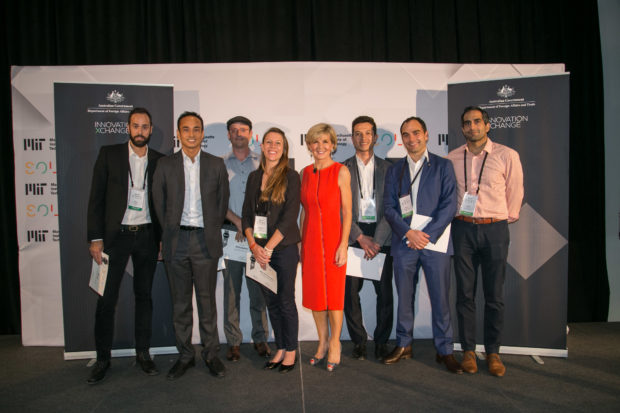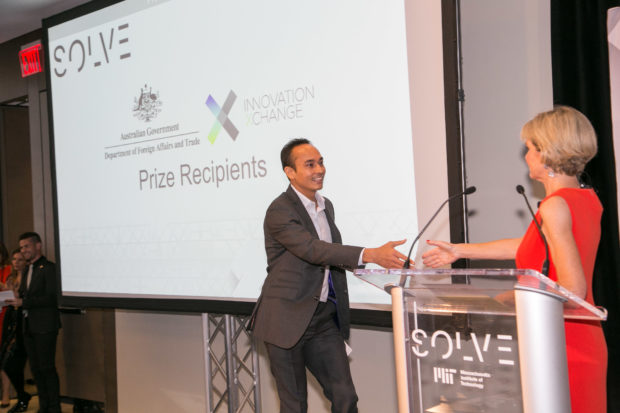More than Math and English: PH team wins P2.6M grant to expand unique after-school learning solution

TULA CEO James Centenera (second from left) stands with Solve winners. Image: The Ultimate Learning Accelerator
“How can disadvantaged youth learn the skills they need to prepare them for the workforce of the future and thrive in the 21st century?”
The Massachusetts Institute of Technology (MIT) posed this question as part of its 2017 Solve, a live pitch event in New York which connects the best solutions to solve the world’s most urgent challenges.
Incidentally, this is the same question that Filipino enterprise The Ultimate Learning Accelerator (TULA) has been wrestling with for the past two years.
Out of 500 pitches, their solution was one of those recognized: developing an after-school program that teaches children 21st century character traits and skills, while also incorporating technology as a learning tool.
The organization won a grant worth $50,000 (approximately P2.6 million) from Australia’s Department of Foreign Affairs and Trade (DFAT) to expand their mission.
Another Philippine team, BagoSphere, made it as a finalist. Its program involves helping poor Filipinos develop skills needed in the workplace through a “well-balanced mix of online learning, group work and teacher-led instruction,” according to its website.
Solving a widening gap in the Philippines

TULA CEO James Centenera at the 2017 MIT SOLVE Challenge Finals in New York City. Image: The Ultimate Learning Accelerator
TULA was founded by James Centenera and Fenton Whelan, who hail from Australia and the United Kingdom respectively; Centenera has Filipino roots from both his parents.
After becoming familiar with the education landscape in the Philippines — both had started as consultants at McKinsey and Co. before getting into education — they observed a yawning gap between accessible education and quality education.
They opened the first three-room center in Legaspi Village, Makati in 2015 with the goal of providing low-cost and high quality education to Filipinos.
The prices range between P300 to P600 per week depending on the number of sessions availed per week. To ensure accessibility for most students, discounts can be availed for public school students.
They also realized it wasn’t just academics that was the problem. Key skills like communication skills and critical thinking skills, and traits and attitudes like grit, leadership and resilience, are not honed in most students under the present education system.
Without mastery of academics and soft skills, Filipinos have had difficulty finding employment even after a university education.
To address this, best practices in education have been adopted from those of leading institutions worldwide such as the U.K., Singapore and Australia. Teachers, called coaches, receive constant training to make sure their instruction is up-to-date and improving.
Modules mainly focus on mathematics and english, while social studies and art are also delved into. Instead of having character development as a separate module, this is combined during lessons, demonstrating that various skills and character traits can be applied to any situation.
The winning 3-minute pitch

TULA CEO James Centenera accepts the grant worth $50,000 after their solution was matched with funding from the Australian government. Image: The Ultimate Learning Accelerator
TULA was the only local team to make it as a Solver. So how did they do it?
“We were invited to a Solv-a-thon hosted by Impact Hub Manila, and from that we completed a detailed online application form that presented our ‘Solution,’” shares Centenera in an exclusive interview with INQUIRER.net.
They were then chosen as a finalist, which meant an exciting trip to New York. The catch? They had to convince 12 judges why their solution was best in only three minutes and six slides.
“We had to communicate what our solution was, how it worked, and how it was both scalable and sustainable for underprivileged communities,” he says.
The pitch was one that was carefully crafted with the organization’s core team, who are also the brains behind TULA’s progressive learning system.
Considering that he was going to present solo, Centenera shares, “I practiced it extensively, getting feedback from a mix of our team members, fellow social entrepreneurs, MIT Solve and friends.”
Learning strategist Ayen dela Torre, who leads in marketing the program, shares that creating a pitch that lasted only three minutes was “daunting.” While the team was confident in their work, there was still apprehension.
“I was partly intimidated by how awesome the other projects were too,” she admits. “We were just hoping that the judges would look at us positively and be excited by what we’re trying to do.”
While Solve required technology to be a part of the solution, Centenera says that TULA was one of the few that addressed the problem with both people and technology instead of simply coming up with a digital solution.
“We mixed both the latest digital technologies with physical, in-person activities with a highly-trained coach,” he explains. “We were the only one really focused on building a new holistic curriculum that covered all the 21st century skills kids need to learn.”
How far can $50,000 go?
TULA’s winnings of $50,000 will go a long way for the organization’s mission.
“Startups at this early stage don’t have enough revenue from customers, so we need funding to survive,” explains dela Torre.
From its present four centers in Makati and Pasig, the plan is to add “at least four more” which could serve hundreds more Filipino children.
“This is really going to help us ensure we can continue towards our goal of transforming education for millions of children across the globe,” she adds.
From the looks of it, TULA is on track. JB
RELATED STORIES:
1.2M grads may not find jobs due to mismatch between skills needed, training — TUCP